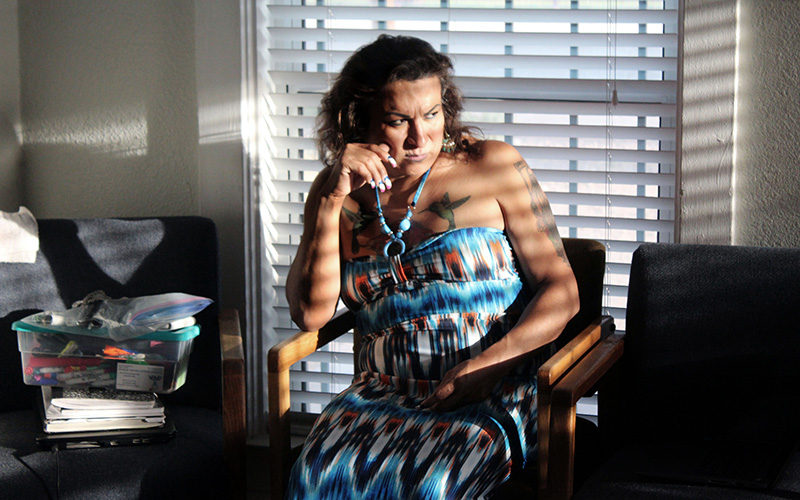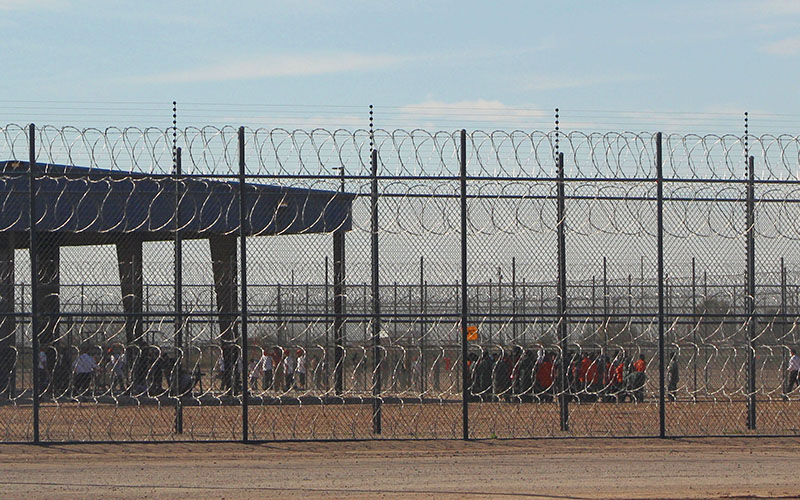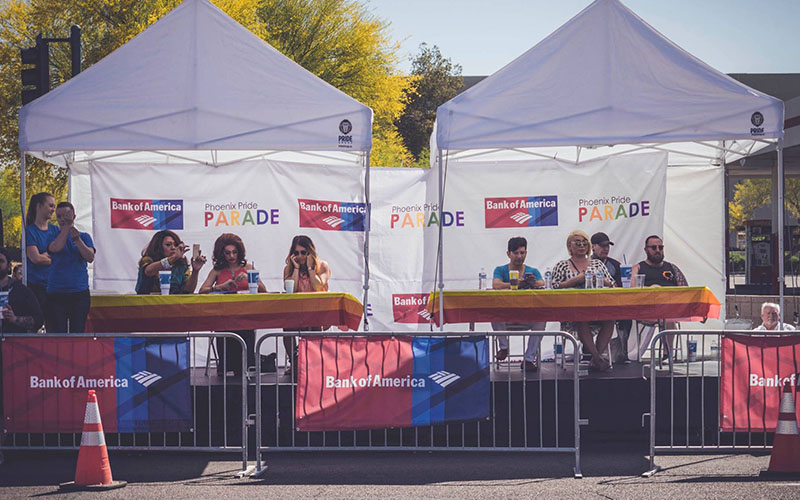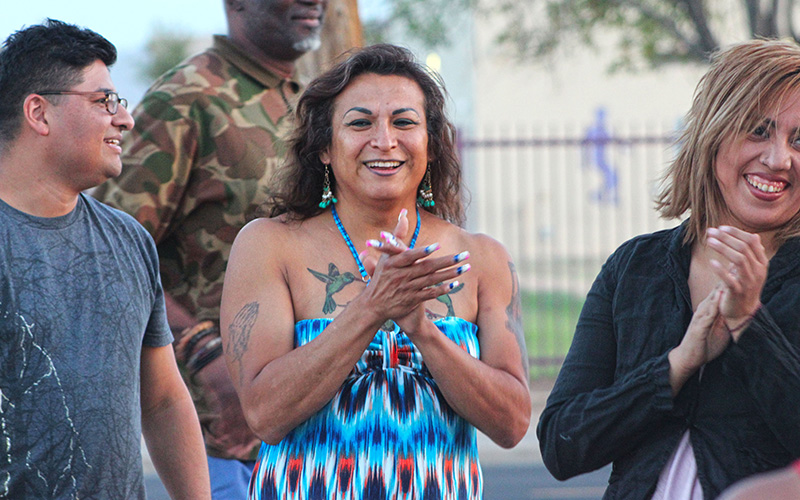
Karyna Jaramillo leads the Trans Queer Pueblo Community Defense and Liberation program in Arizona to help LGBTQ immigrants in detention centers. (Photo by Charlene Santiago/ Cronkite News)
Karyna Jaramillo lives in fear that she’ll be deported and sent back to her hometown in Morelos, Mexico where she could face persecution. “Deporting me is like sending me straight to my death,” she said in Spanish.
Jaramillo is a transgender woman, an undocumented immigrant and leader for migrants who fear persecution in their home countries and feel excluded by LGBTQ organizations in the U.S.
“We’re vulnerable but we’re also very strong and powerful people,” she said.
U.S Immigration Customs Enforcement (ICE) detained Jaramillo in 2015. She said ICE failed to recognize her gender identity. Instead, she was taken to an all-male unit in the Eloy Detention Center.

U.S. Immigration and Customs Enforcement (ICE) detainees gather in the courtyard at the Eloy Detention Center. (Photo by Charlene Santiago/Cronkite News)
She said she remembers how male inmates referred to her as “fresh meat” when she first arrived at the detention center. Jaramillo was later placed in solitary confinement. “I felt depressed. At one point I wanted to end my life and not live anymore,” Jaramillo recalled with tears in her eyes.
She was freed on a $4,000 bond after two weeks in the Eloy detention center. Now she fights to ensure other transgender immigrants don’t go through the same experience.
Immigration Incarceration and Gender Identity
Shortly after her release in 2015, Human Rights Watch published a report that led ICE to make changes to its transgender detention center placement and care guidelines. The 68 page report was based on interviews with 28 transgender women detained by ICE between 2011 and 2015.
“The Transgender Care Memorandum reaffirms ICE’s commitment to provide a safe, secure, and respectful environment for all those in our custody, including those individuals who identify as transgender,” Thomas Homan ICE Office of Enforcement and Removal Operations (ERO) Executive Director said in a statement.
Through the transgender care memorandum ICE assigned a local LGBTQ liaison to work closely with staff in each field office. The memorandum established a committee to oversee clothing options, housing and medical care for inmates.
ICE has two facilities with designated units for transgender individuals. In 2011 The Santa Ana City Jail in California became the first of its kind when it opened a 200 capacity unit to house transgender detainees.
In December the Santa Ana City Council voted to reduce the prison’s capacity maximum of 128 or immigration detainees. And in January, the city council officially declared Santa Ana a “sanctuary city.” ICE issued a 90 day notice in February to end the contract with the city jail. Immigration services will conclude in May 24 of this year.
According to ICE spokeswoman Virginia Kice, the transgender unit housed 11 immigrants in April. Kice said, “any detainees housed at the Santa Ana Jail will be transferred to appropriate housing within ICE’s detention system before the contract term expires.”
The Transgender Care Classification Committee will make appropriate custody arrangements. In an email Kice said, “There are a variety of options, including the dedicated transgender housing unit at the PraIrieland Detention Center.”
The Prairieland Detention Center opened in Texas in January 2017. The facility includes a dormitory for 36 transgender inmates. It’s operated by Emerald Correctional Management which runs seven ICE detention centers in the country.
Living in the shadow of LGBTQ communities in the U.S.
As the LGBTQ undocumented immigrants gain recognition from ICE in detention centers, they’re fighting another battle this one over the 2017 Phoenix Pride Festival’s main sponsor, a financial lender for private companies that manage detention facilities in Arizona.
Bank of America, finances Core Civic, formerly the Corrections Corporation of America (CCA). Core Civic runs nationwide private prisons and detention centers, including the Eloy Detention Center and the Florence Detention Center in Arizona.
In the eyes of Trans Queer Pueblo, an advocacy group for LGBTQ migrants of color, Bank of America sponsors “immigrant community incarceration.”
“They don’t know the history of what started as an anti-police protest and now it’s more of a way for corporations to profit out of all of us,” said Dago Bailon, a Trans Queer Pueblo member as he referred to Bank of America’s financial alliance with Core Civics.

The Phoenix Pride Festival’s main sponsor, Bank of America, is a lender for Core Civic, a company that runs immigration detention facilities in Arizona. (Photo courtesy of Diego Lozano)
Jesus Cisneros author of “Undocuqueer: Interacting and Working within the Intersection of LGBTQ and Undocumented” said Phoenix Pride neglected its founding principles by failing to be inclusive of those affected by immigration policies.
“There are many communities on the margin of these victories because they’re more concerned about survival and just being able to live with dignity and not being subject to family separation because of deportation,” Cisneros said referring to the factors that led Trans Queer Pueblo to protest during the Pride Festival’s parade.
Trans Queer Pueblo e-mailed Phoenix Pride’s executive director Justin Owens days before the festival’s scheduled start date. In the email they shared their concerns and their plans to march during the Sunday parade. According to Owens, given the group’s late notice he couldn’t address the group’s concerns, but he welcomed them to work together for future Phoenix Pride events and affairs.
“We are aware that there are still many causes that need attention, and we always stand willing to work with members of our community to end oppression and injustice of any kind and against any individual or group,” he said in a statement released on Friday, after receiving the group’s email.
Phoenix Pride and Trans Queer Pueblo will have their first meeting in late April. Trans Queer Pueblo members said they’re “looking forward to start a conversation that is way overdue.” In the meeting they plan to share testimonies of transgender people currently detained in Eloy and Florence with the director of Phoenix Pride.
Lack of Transgender rights in Mexico
“We can’t reach equality if we’re not addressing the root of the problem,” Bailon said.
Many Latino transgender immigrants in the U.S. say they were forced to leave their home countries. In Mexico Congress passed a law in 2003 to prevent discrimination of gay and lesbian citizens. But the law does not address gender identity concerns or protect transgender people from discrimination or violence.
In some cases local laws in Mexico target transgender people. In the city of Tecate in 2002, an an amendment to the Police and Good Governance Code made it illegal for any “man to dress as a women in public.”
The Trans Murder Monitoring (TMM) Project by Transgender Europe (TGEU) published updated research that shows Latin American countries top the list.
“Throughout all six world regions, the highest absolute numbers have been found in countries with strong trans movements and trans or LGBT organizations that carry out some kind of professional monitoring: Brazil (900), Mexico (271), Colombia (114)…” according to a statement by researchers who worked on the monitoring project.
For immigrants fleeing violence getting asylum in the U.S. can be difficult. Immigration judges often cite a lack of evidence and witnesses for the applicant.

Karyna Jaramillo leads a Trans Queer Pueblo (TQP) meeting. The group wants Phoenix Pride to be more inclusive and support LGBTQ migrants of color. (Photo by Charlene Santiago/ Cronkite News)
Understanding the process for applying for asylum is another hurder. Jaramillo, missed the one-year filing deadline to apply for asylum after arriving in the U.S. and like many other transgender migrants, does not have legal status or protection.
Trans Queer Pueblo is offering “Know Your Rights” forums and legal defense courses to educate immigrants as fears about deportations grow. The nonprofit organization also organizes monthly visits to the Eloy and Florence detention centers to offer their peers support during their immigration court hearings.
To this date, The Community Defense and Liberation Program led by Jaramillo has helped get 15 transgender people released from immigration detention centers in Arizona.
“Now more than ever we need to make sure we are working together for all of our liberation,” Bailon said.